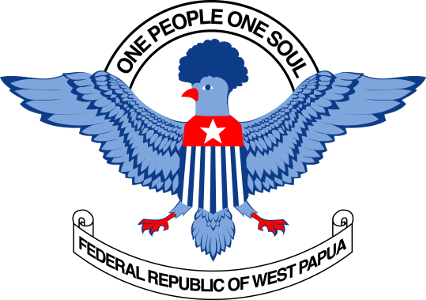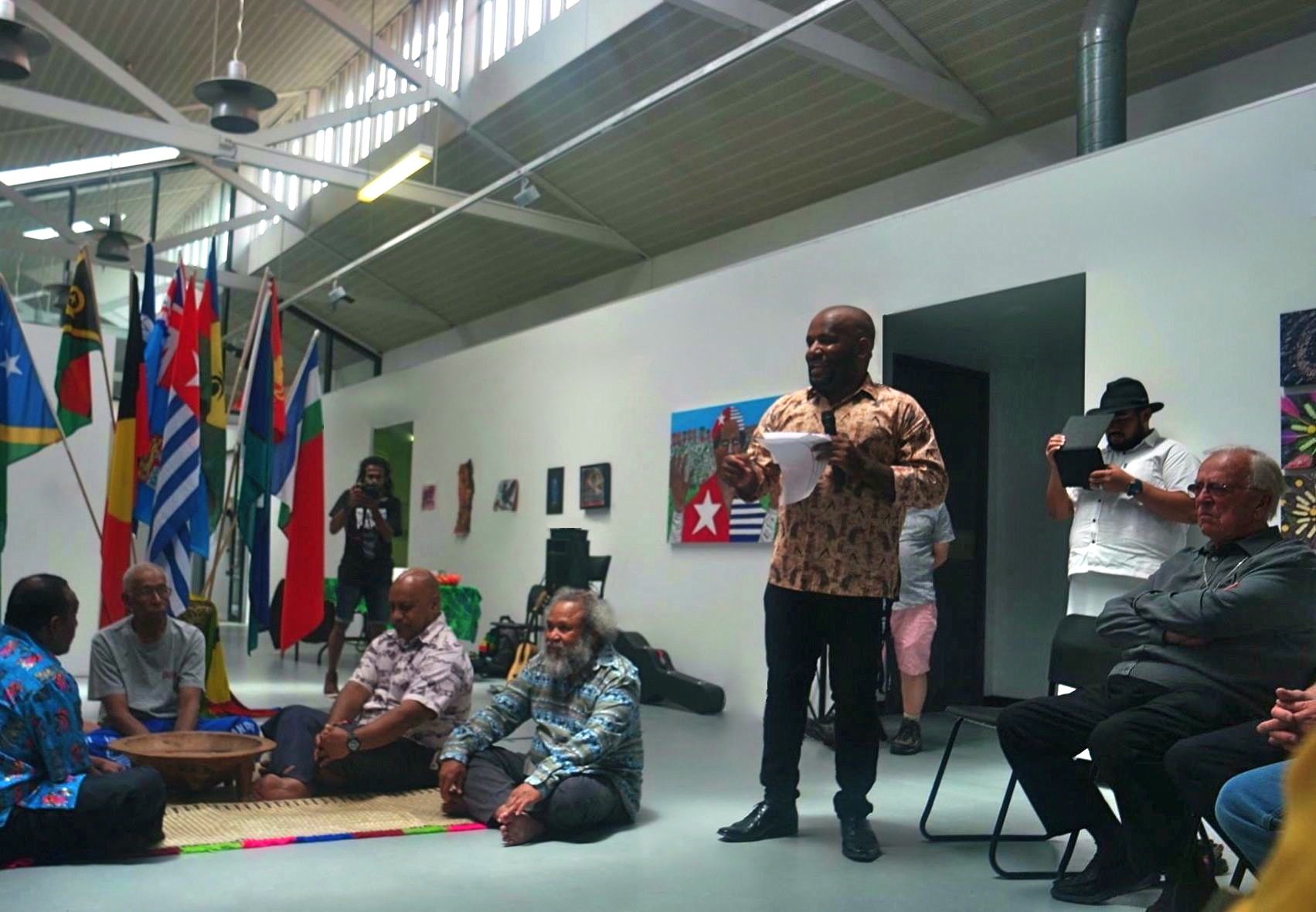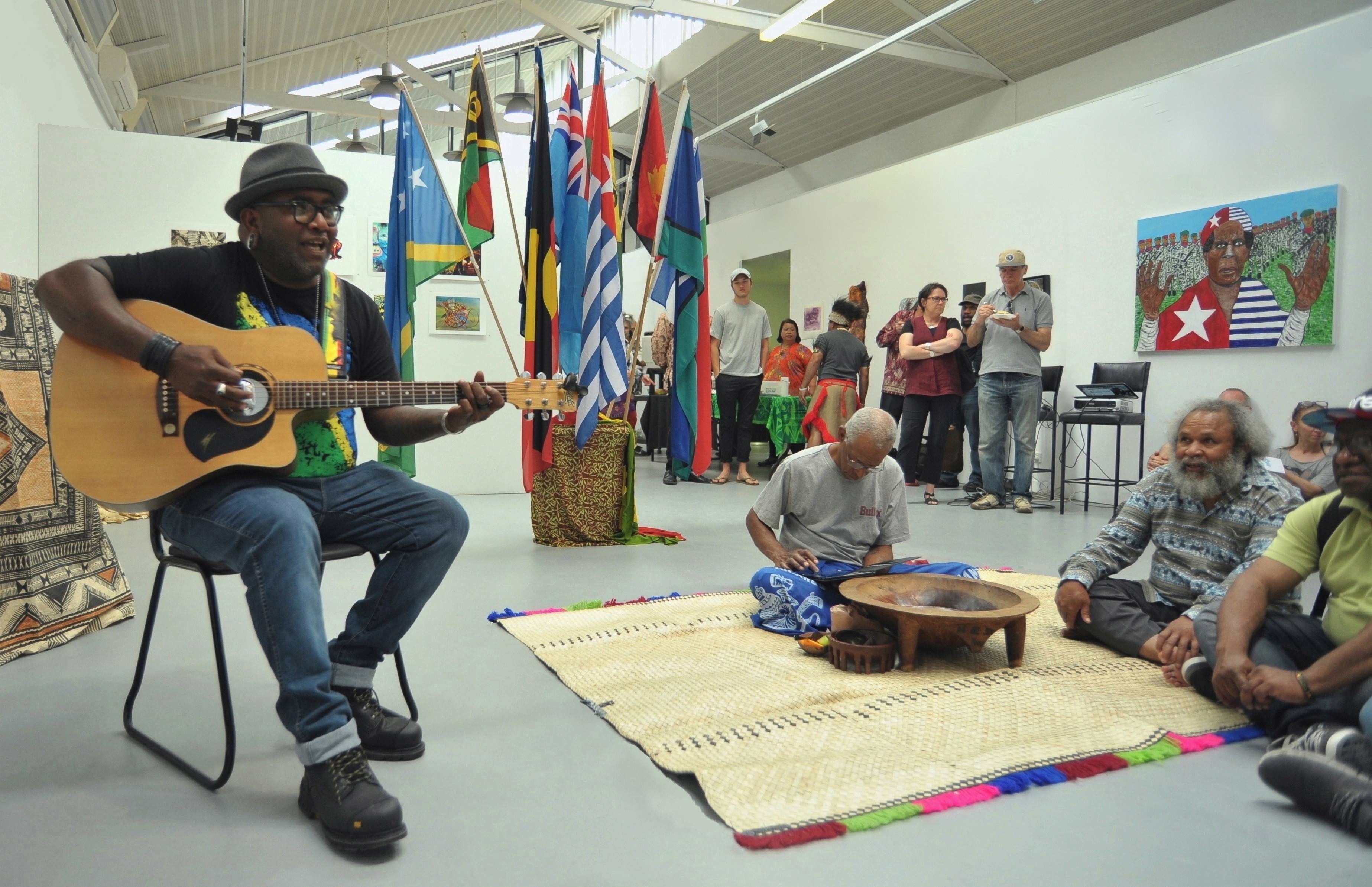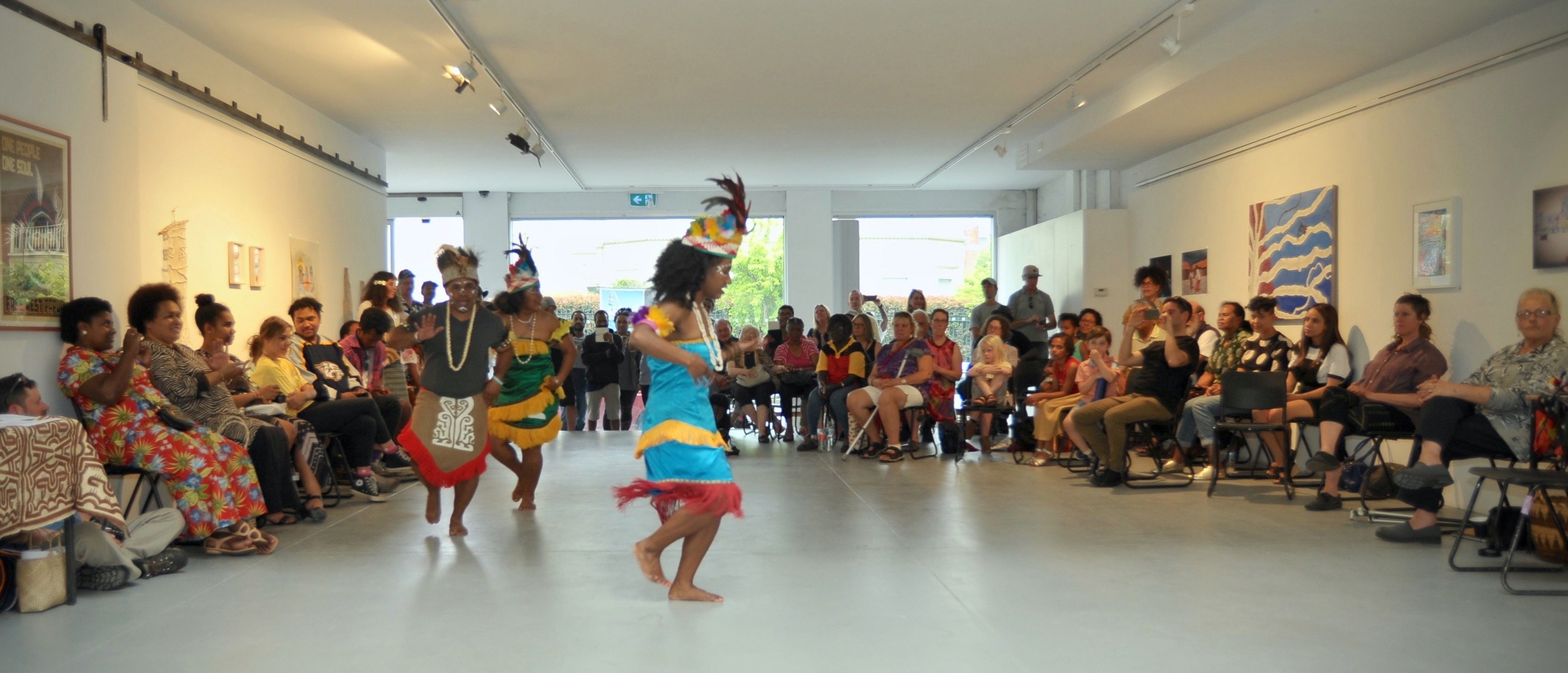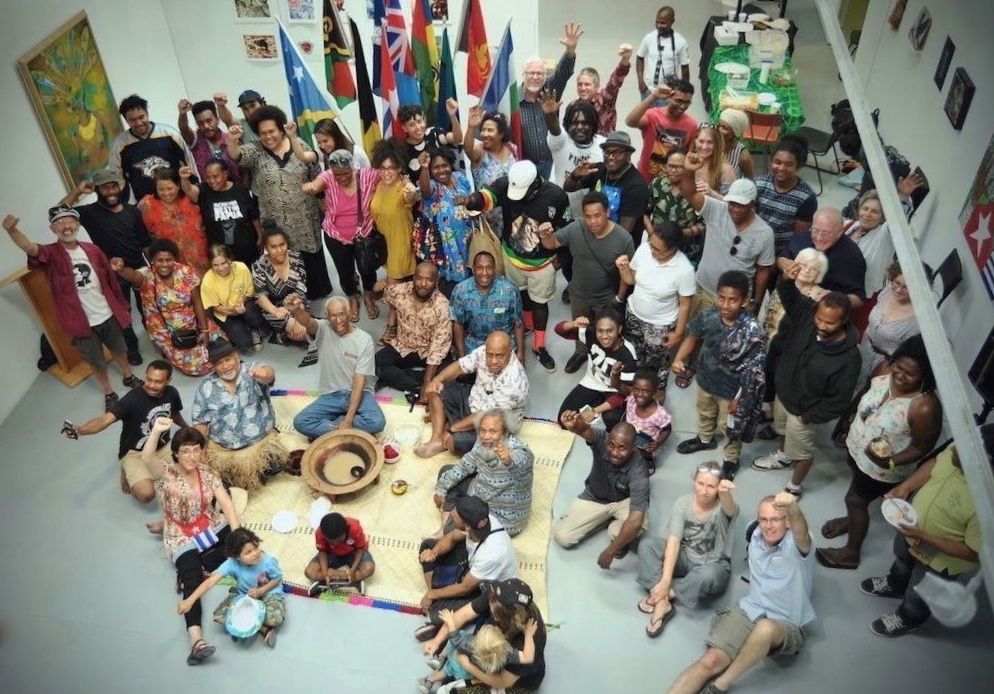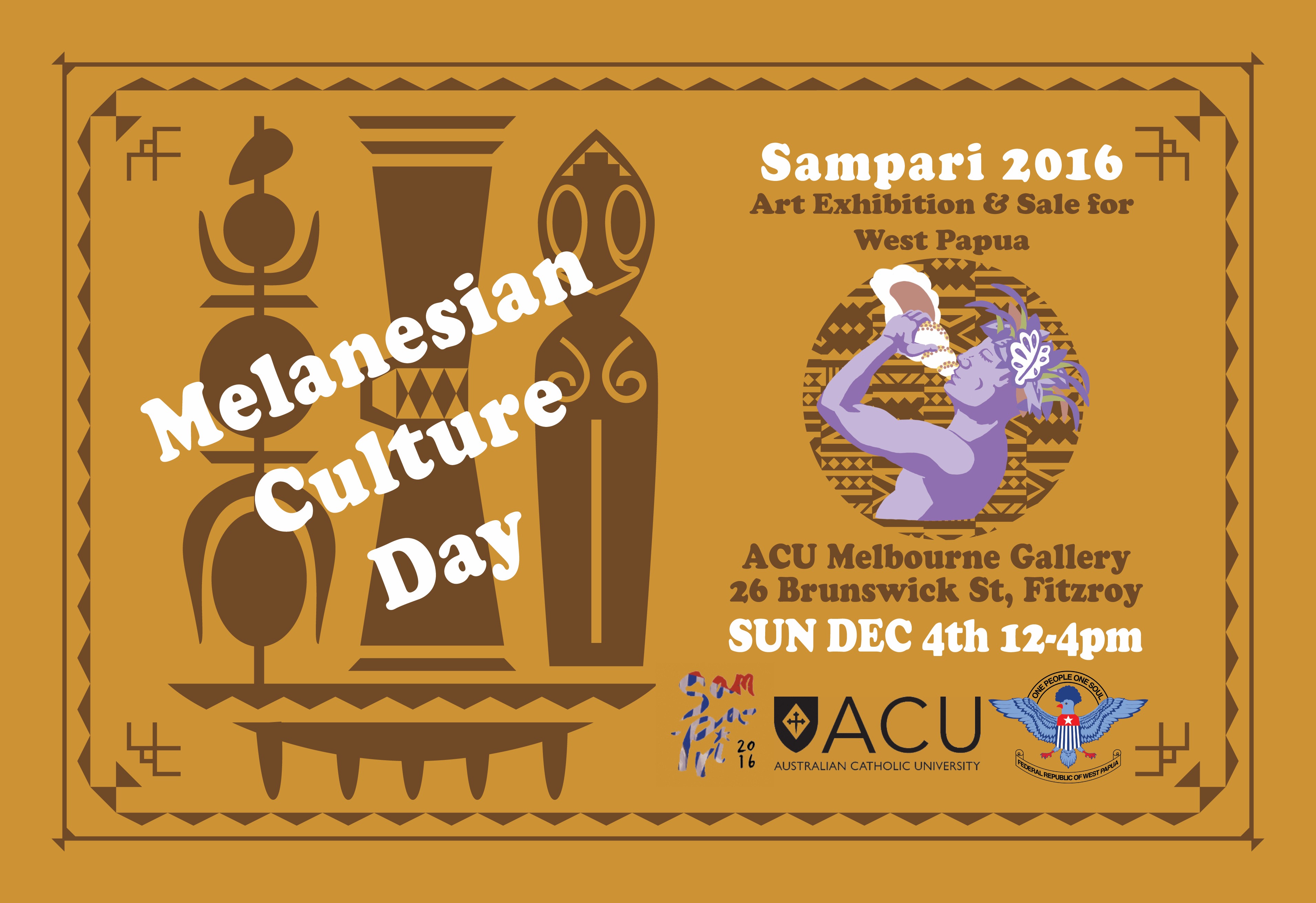
LOBAR WAINGGAI’s miniature honai, with baby kava bowl on Fiji bark cloth (tapa) Saluting Melanesia, ACU Art Gallery, 4 December 2016 (Photo, Tommy Latupeirissa)
Saluting Melanesia was an exciting ceremonial occasion, beginning with a solemn kava ceremony, which invited Oceanic communities to celebrate their origins and living cultures, including young Melanesians born or living in the diaspora talking about their cultural experiences, dancers performing their traditions, musicians telling tales about the past and the future, and, of course, a dazzling display of food featuring indigenous products and recipes.
The Federal Republic of West Papua hosted the occasion in the Australian Catholic University’s Art Gallery in Fitzroy during the 2016 Sampari Art Exhibition for West Papua, which included a special Melanesian Wall of Art.
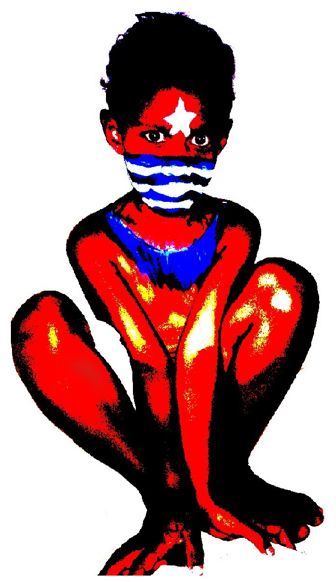
MERE RASE’s BABY DAUGHTER from Sugartown in Fiji, Melanesian Wall of Art, 2016 Sampari Exhibition for West Papua
The Melanesian Wall of Art was a display of vibrant prints by artists from Solomon Islands, Vanuatu, West Papua, Fiji and Papua New Guinea. It celebrated the Melanesian Spearhead Group’s decision in 2015 to recognise West Papua as an Observer of its small intergovernmental forum, which catapulted its kin out of the isolation imposed on them on 1 May 1963 when Indonesian President Sukarno declared West Papua an Operational War Zone, banned foreign media, and reactivated old Dutch colonial laws of subversion. Shouldering their kin’s trouble was expensive. Indonesia splintered the organisation with bribes, treaties, promises of aid and trade, and even applied for full membership itself based on an outrageous claim that it is home to eleven million Melanesians [Note 1, below].
Indonesia’s machiavellian manoeuvres bulldozed chasms between Melanesian politicians and their communities, especially in PNG and Fiji whose leaders endorsed Indonesia’s application for membership (rather than West Papua’s). The decision by these two ‘older, bigger brothers’ divided them from the ‘younger, smaller siblings’ (Vanuatu, Solomons, the Kanak of New Caledonia), forcing the MSG Chair in 2015, Manessah Sogavare (Prime Minister, Solomon Islands) to accept both West Papua’s and Indonesia’s applications. The compromise devised was to offer Indonesia Associate membership, and West Papua the lower status of ‘Observer’. This angered many, because it enabled a large wealthy mostly Muslim Asian state to sit in the motherhouse of four tiny predominately Christian Melanesian nations.
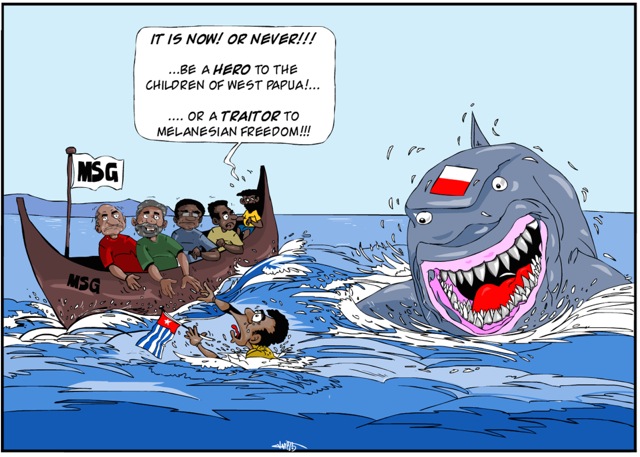
CAMPION OHASIO (Solomon Islands) Heroes or traitors of West Papua Melanesian Wall of Art 2016 Sampari Art Exhibition (published by The Island Sun newspaper in Honiara during MSG Summit in 2015)
In 2016, the leaders of Polynesian and Miconesian nations—namely Tonga, Marshall Islands, Tuvalu, Nauru, Palau—joined the MSG petitioners as a Pacific Coalition for West Papua. Based at Hawai’i University, the Coalition initiated debate in the 71st UN General Assembly for West Papua to be added to the UN Decolonisation List. [Note 2, below].
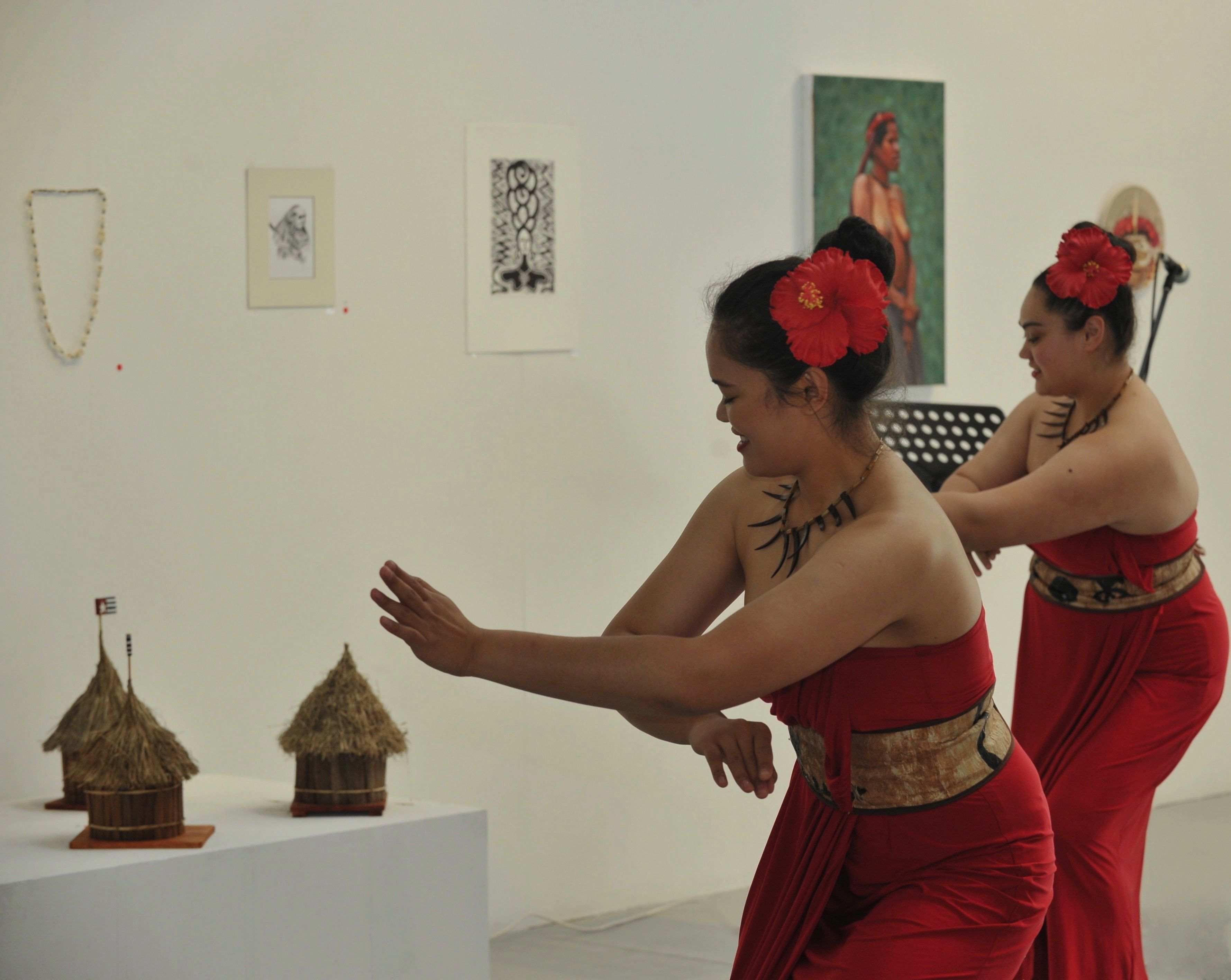
SAMOANS lending grace and support (Photo: Tommy Latupeirissa, 350 Pacific and West Papua Forum, 2016 Sampari Art Exhibition for West Papua, 10 December 2016)
Saluting Melanesia opened in the ACU Art Gallery with a Kava Ceremony led by Bula Rendiring and Sef Suka Seviua, two Fiji chiefs who reside in Melbourne. Before they mixed and served the kava to honoured guests, Dr Robert Wolfgramm spoke to young Melanesians brought up and educated in Australia (where kava is illegal) about the relationship between kava and culture. He talked of the plant’s origin in West Papua, its place in high culture and social discourse across indigenous Pacific cultures, stressing that kava is neither part of a bygone culture nor an appropriate alternative to alcohol [Note 3 for Robert’s full address].
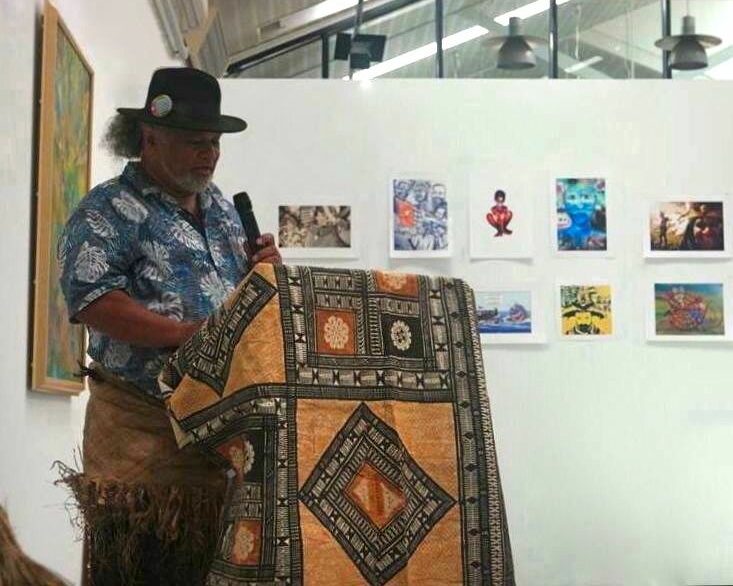
DR ROBERT WOLFGRAMM introducing kava in culture to young Melanesians born and living in the diaspora (Photo: Tommy Latupeirissa, ACU Art Gallery, 4 December 2016)
After the chief’s implored the blessing of the ancestors, and their intercession on a series of stated community concerns and tribulations, they invited people in the gallery to sit on the kava mat with them while the feast prepared by Dapur Sampari (Papua Kitchen) was being served.
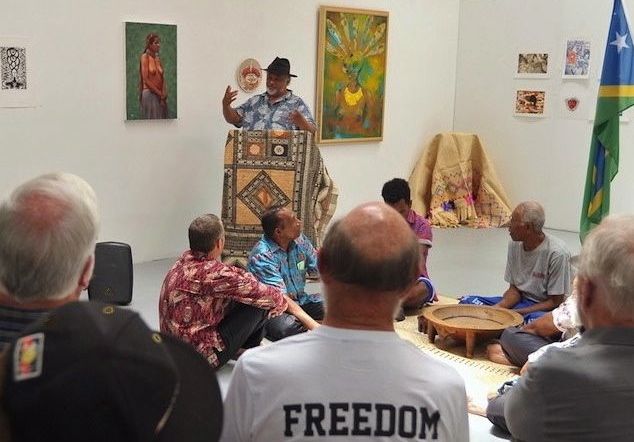
REV. PETER WOOD Anglican Church, DR ROBERT STRINGER Uniting Church, BISHOP HILTON DEAKIN Roman Catholic Church (Photo, Tommy Latupeirissa, 4 December 2016)
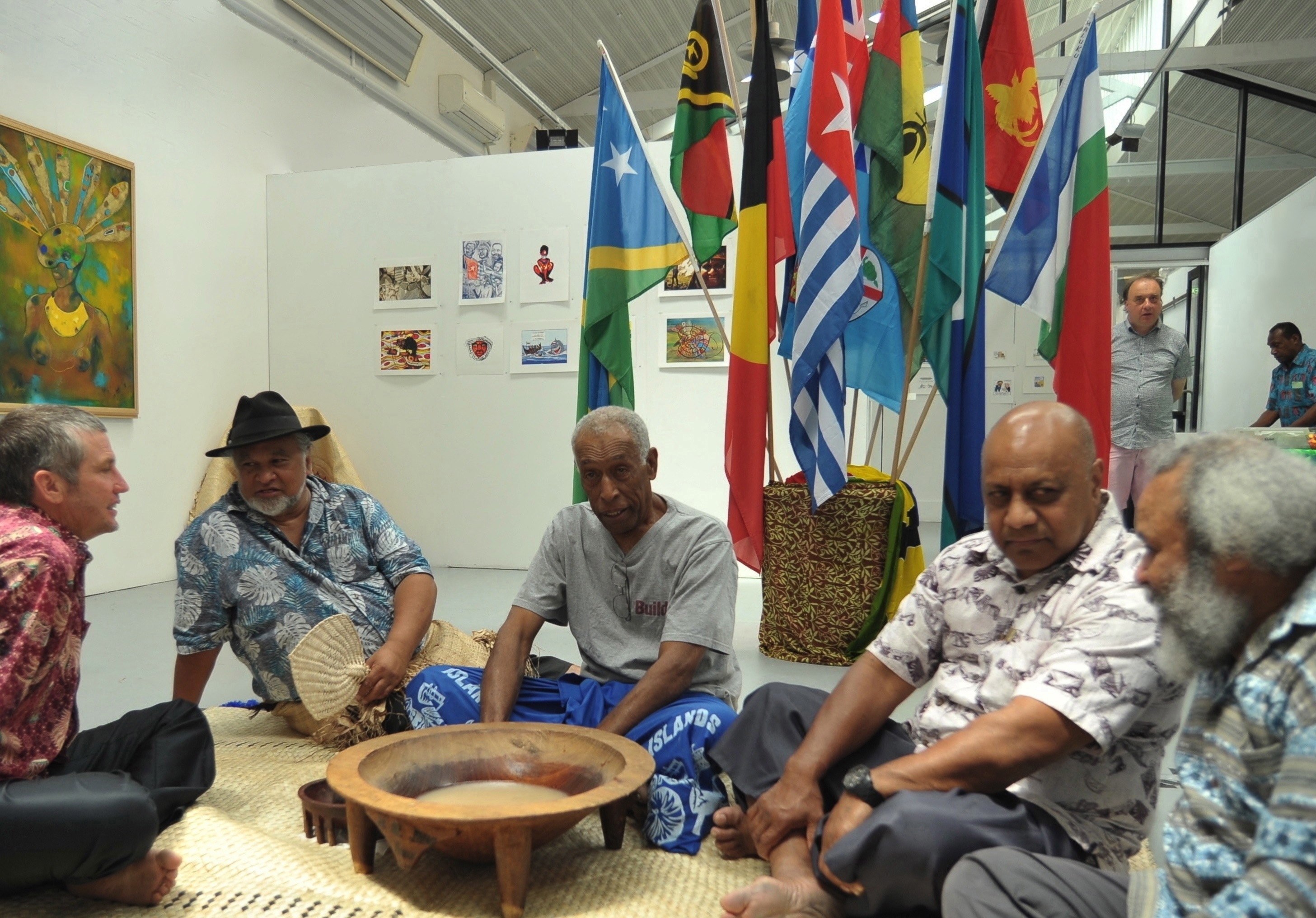
Fiji Chiefs Bula Rendiring and Sef Suka Seviua with Robert Wolfgramm, Jacob Rumbiak from West Papua, and an Australian activist (Photo, Tommy Latupeirissa, ACU Art Gallery, 4 December 2016)
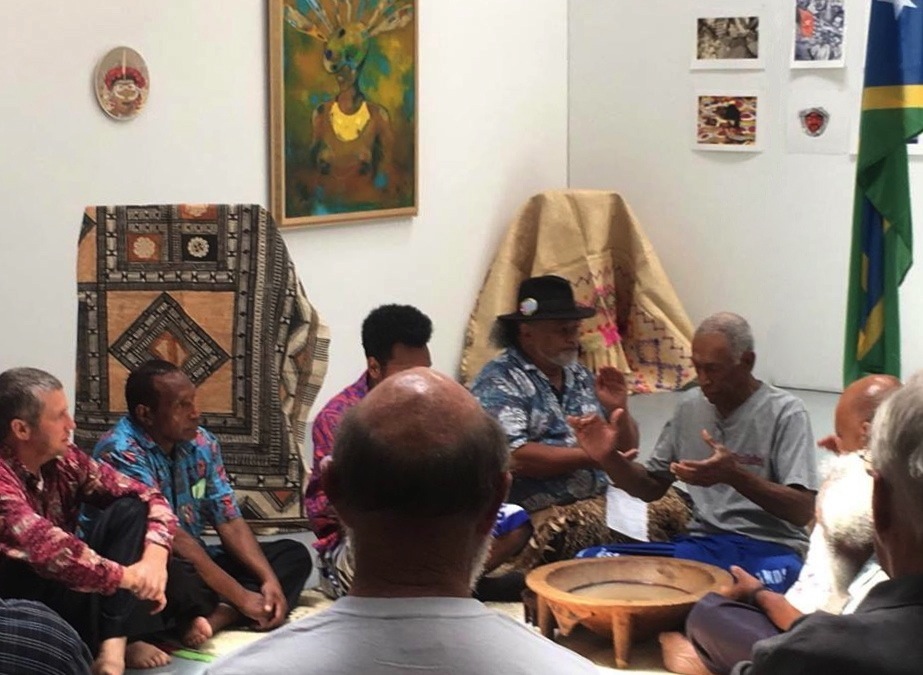
FIJI CHIEFS ON THE KAVA MAT with Alfonse Adadikam, President of West Papua Community in Victoria (Photo: Tommy Latupeirissa, Saluting Melanesia, 4 December 2016)
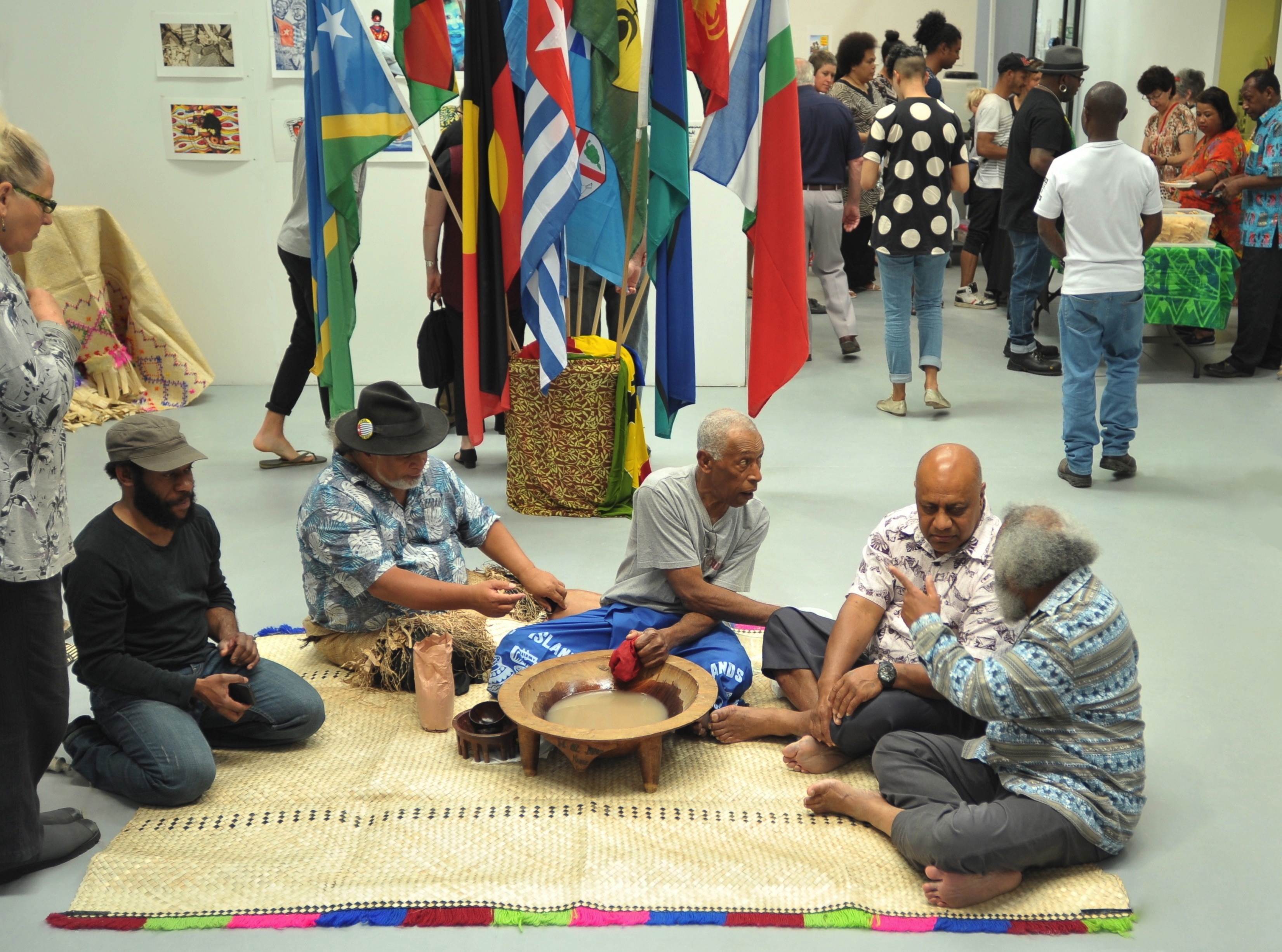
FIJI CHIEFS ON THE KAVA MAT Gilius Kogoya from West Papua who came to Australia on a double-outrigger canoe in 2006 (Photo, Tommy Latupeirissa, 4 December 2016)
Dapura Sampari (Papua kitchen) served Papuan recipes prepared by Natalie Adadikam and Babuan Mirino. Traditional West Papuans have a seed-to-plate custom born of a history arcing back 7000-9000 years when they domesticated the wild ancestors of sugarcane, hibiscus spinach, highland pitpit, pandanus, taro, banana, and numerous other species. During this dry period, at the end of the last Ice Age, a drainage method (water control) was also perfected. Pig husbandry developed after Austronesian speakers arrived about 3,500 years ago.
“When our island people meet someone from the highlands, we barapen (feast). We cook pig—the feast-food of the mountain people, vegetables, and fish—which is more usually part of the island diet. Sharing customs and eating together, that’s our polite form” (Jacob Rumbiak, Federal Republic of West Papua)
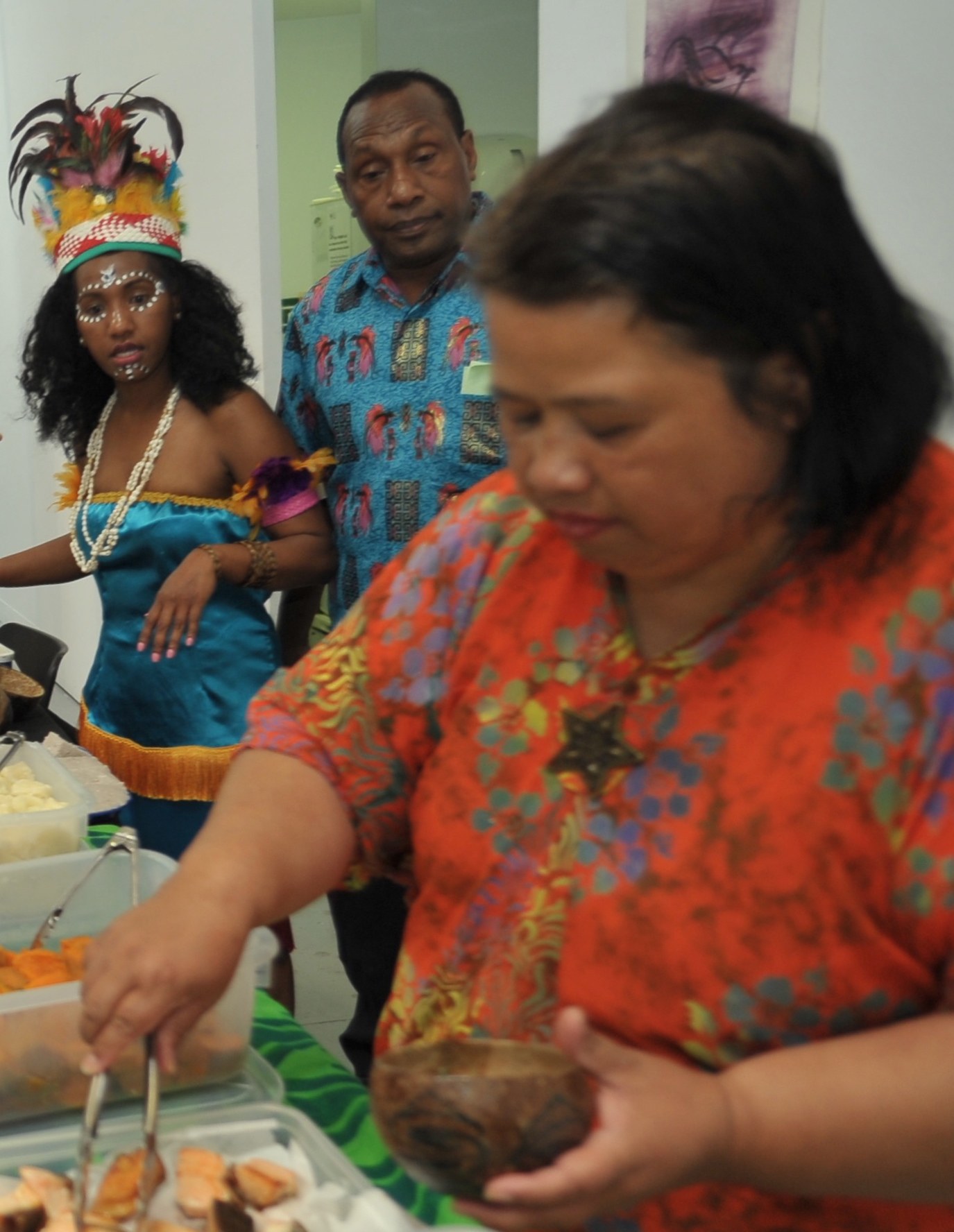
DAPUR SAMPARI Natalie and Alfonse Adadikam and Emily Wainggai serve West Papuan recipes in prepared coconut bowls (Photo, Tommy Latupeirissa)
Jefry Jikwa (below) is Dani from Wamena in the Central Highlands of West Papua. In 2006 he boated to Australia in a traditional double-outrigger canoe with 42 other West Papuans and asked for asylum. He organised Saluting Melanesia with Maluku independence advocate Tommy Latupeirissa, and thanked Bishop Hilton Deakin (Patron of Australia West Papua Association-Melbourne) for his acute observations of the role of churches and activists in East Timor’s independence struggle.
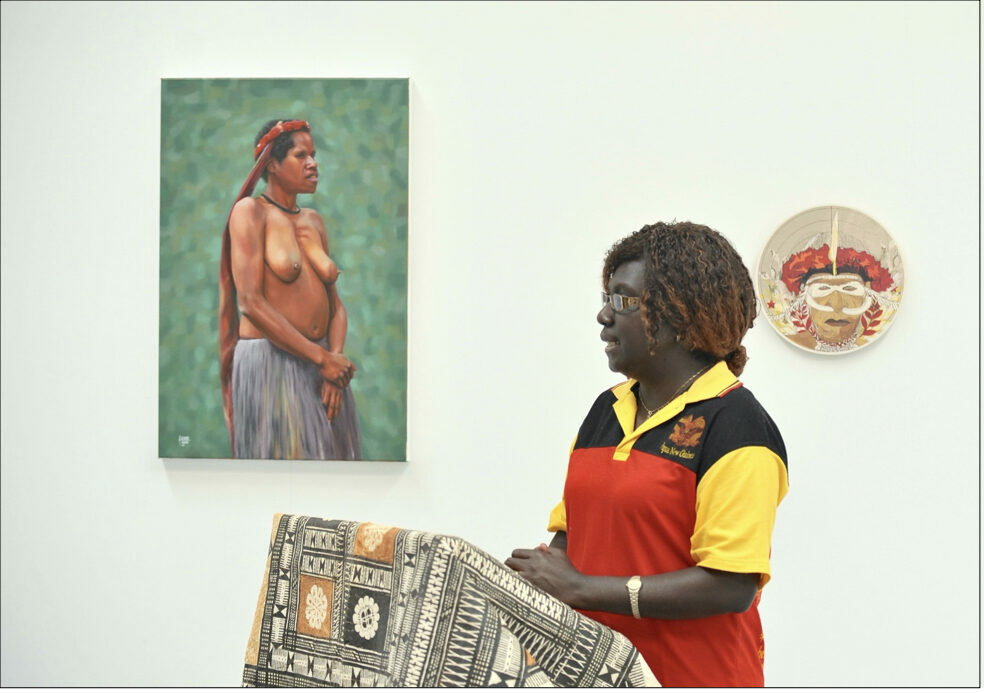
ELLA BENORE ROWE Papua New Guinea (Photo: Tommy Latupeirissa, 4 December 2016)
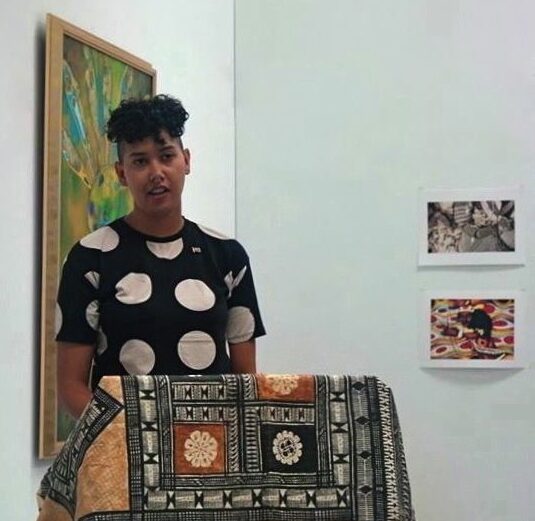
SANDRA COLDITZ Solomon Islands (Photo: Tommy Latupeirissa, 4 December 2016)
Three young West Papuans performed Yospan, a derivative of two dances, yosim and pancar, which were joined by edict in Jayapura in the early 1980s at a seminar convened to select the province’s official dance. Yosim, a slow jog, is an older dance from Sarmi. Pancar, from Biak, is of relatively recent origin, traceable to the military buildup that preceded the end of Dutch colonialism, when rumours of an impending Indonesian attack swept the island. Apparently the drills of Dutch fighter pilots inspired an artist to invent a step, pantja gas (‘jet’) that imitated an airplane entering a stall. (Note 4 below for more on Yospan).
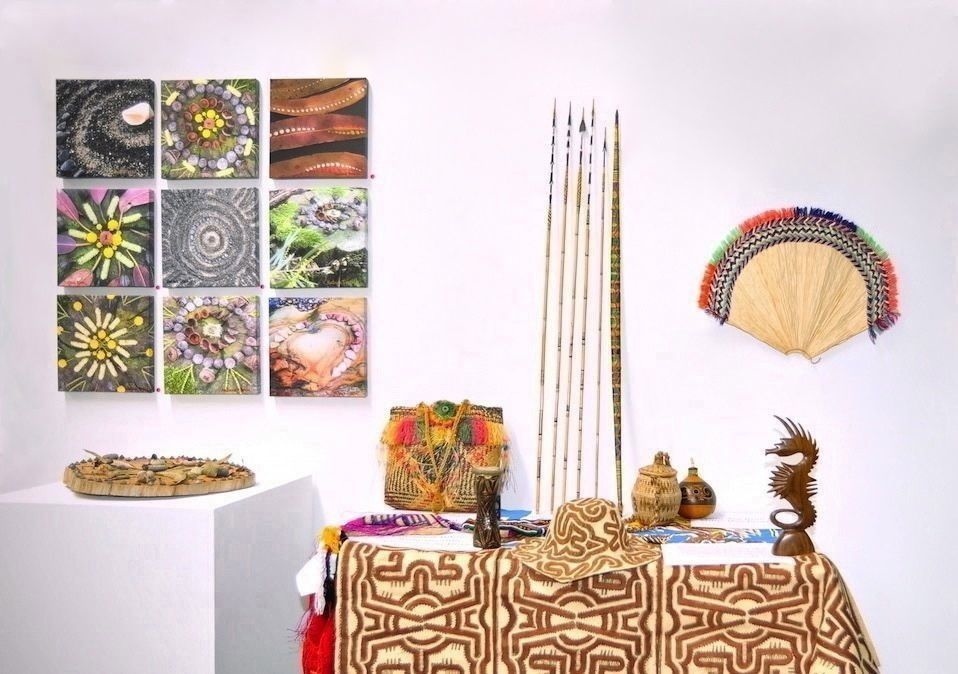
Papua New Guinea culture alongside Barbara Tipper’s memorial artwork Ephemeral celebrating the strength, resilience and faith of West Papuan freedom fighters and political prisoners (Photo, Tommy Latupeirissa, Saluting Melanesia, ACU Art Gallery, 4 December 2016)
NOTES
1. Asia Pacific Report, April 2016 Asia Pacific Report, 8 April 2016. Indonesia strengthens ties with Pacific ‘good friends’
2. Pacific Coalition for West Papua, December 2015 Pacific Coalition for West Papua, December 2016
3. Dr Robert Wolfgramm’s key note speech for Saluting Melanesia Robert Wolfgramm, Melanesia Kava Symbolism
Robert Wolfgramm lectured in the School of Political and Social Inquiry at Monash University for decades; was editor-in-Chief of the Fiji Daily Post until the Bainimarama administration forced its closure in 2010; translated the New Fijian bible; was coach of the Fiji junior team that won the AFL International Cup in 2011; is also a musician of note and father of The Wolfgramm Sisters.
4. Dr Danilyn Rutherford ‘Yospan’ YOSPAN, Danilyn Rutherford, 1996, p589-594

